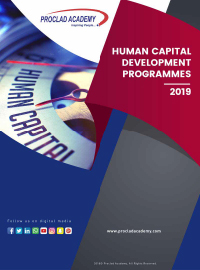Best Practices in Managing & Enhancing Employee Relations
| Ref No. | Dates | Venue | Fee (US$) | |
|---|---|---|---|---|
| HR 007 | 13 - 17 Apr 2020 | Barcelona | 5000 | Register |
| HR 007 | 06 - 10 Jul 2020 | Geneva | 5000 | Register |
| HR 007 | 07 - 11 Dec 2020 | Kuala Lumpur | 5000 | Register |
Best Practices in Managing & Enhancing Employee Relations
Introduction
The term 'Employee Relations' refers to a company's efforts to manage relationships between employers and employees. An organisation with a good employee relations program provides fair and consistent treatment to all employees so they will be committed to their jobs and loyal to the company. Such programs also aim to prevent and resolve problems arising from situations at work. One of the most effective ways for an organisation to ensure good employee relations is to adopt a human resource strategy that places a high value on employees as stakeholders in the business.
PROCLAD Academy’s premium quality Managing & Enhancing Employee Relations training course allows participants to reflect on what best practice looks like for their organisation, and learn the right systems, policies and leadership style embedded through the culture of their organisation.
The key features of PROCLAD Academy’s Best Practices in Managing & Enhancing Employee Relations training course are:
- Recognise opportunities for building strong employee relations
- Identify opportunities to review employee relations policies against best practice
- Provide guidance in evaluating and addressing performance concerns
- Ascertain and deal with employee conduct/disciplinary issues
- Acquire skills to analyse and process employee grievances
- Learn to improve and maintain employee productivity, motivation, and morale
Learning Objectives
By attending PROCLAD Academy’s highly interactive Best Practices in Managing & Enhancing Employee Relations training course, delegates will:
- Consider what effective employee relations looks like
- Identify the practical steps necessary to build strong employee relationships
- Review Employee Relations policies including discipline, grievance & capability
- Plan for dealing effectively with situations where employee behaviour falls below the expected standard
- Identify opportunities to support team leaders and supervisors in delivering effective Employee Relations practices
- Support staff in the delivery of their job role
Target Audience
PROCLAD Academy’s Best Practices in Managing & Enhancing Employee Relations training course is designed for:
- Leaders and staff working in the personnel management or training sectors
- Line managers who want to develop their understanding of Employee Relations issues
- Anyone wishing to develop a career in personnel management and employee development
Training Methodology
PROCLAD Academy’s practical and results-oriented Best Practices in Managing & Enhancing Employee Relations training course is based on adult learning concept. It incorporates short inspiring lectures with structured lessons from the learning manual; captivating PowerPoint slides with videos to enhance learning; ongoing discussions with action planning; ample time for Q&A; training activities to reinforce key concepts within a fun learning environment.
Course Outline
- What is employee relations all about?
- Why is it important?
- The importance of having sound ER policies
- The psychological contract
- Managing conflicting interests
- Links between employee relations specialists in line managers
- Internal communications and managing the message
- Team briefings
- Involvement, engagement and consultation
- Dealing with sickness absence
- Conducting effective return to work interviews
- Providing mediation services
- Can’t or won’t? – the difference between conduct and capability
- Dealing effectively with disciplinary situations
- Dealing with gross misconduct
- Dealing effectively with capability situations
- Deciding whether to suspend
- Conducting excellent investigations
- Presenting evidence at hearings
- Dealing with appeals
- Designing effective staff surveys
- Analysing the data and learning the lessons
- Dealing with collective disputes
- Employee recognition
- Codes of conduct and ensuring compliance
- Dealing with grievances
- Managers right to manage
- Developing a coaching style of management
- Motivating staff to perform and giving effective feedback
- Managing performance effectively
- Identifying and dealing with bullying and harassment
- Managing personal issues


